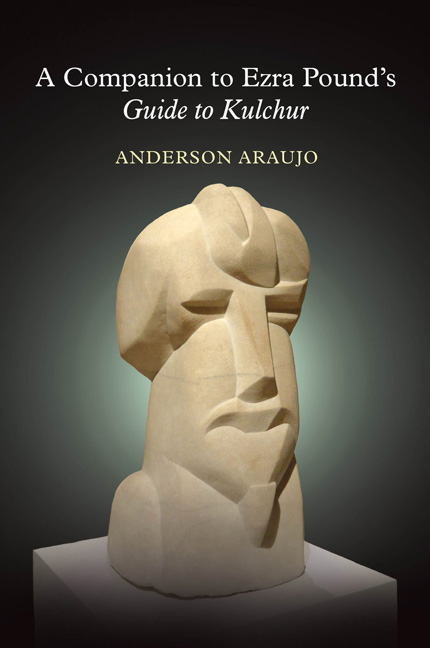Book contents
- Frontmatter
- Contents
- Acknowledgments
- Abbreviations
- Introduction
- Guide to Kulchur
- Part I
- Section I
- Section II
- Part II
- Section III
- Section IV
- Part III
- Section V
- Section VI
- Part IV
- Section VII
- Section VIII
- Section IV
- 38 Education Or Information
- 39 Neo-Platonicks Etc.
- 40 Losses
- 41 Odes: Risks
- 42 Great Bass: Part Two
- 43 Tone
- Part V
- Section X
- Section XI
- Part VI
- Section XII
- Section XIII
- Addenda: 1952
- Notes
- Index
38 - Education Or Information
from Section IV
- Frontmatter
- Contents
- Acknowledgments
- Abbreviations
- Introduction
- Guide to Kulchur
- Part I
- Section I
- Section II
- Part II
- Section III
- Section IV
- Part III
- Section V
- Section VI
- Part IV
- Section VII
- Section VIII
- Section IV
- 38 Education Or Information
- 39 Neo-Platonicks Etc.
- 40 Losses
- 41 Odes: Risks
- 42 Great Bass: Part Two
- 43 Tone
- Part V
- Section X
- Section XI
- Part VI
- Section XII
- Section XIII
- Addenda: 1952
- Notes
- Index
Summary
German Universities: By the early twentieth century, German universities were among the world's top-ranked institutions, attracting many foreign students, including T. S. Eliot, who briefly attended a summer school at Marburg University before fleeing for London once the First World War broke out in August 1914.
I wasted time … Lope's plays: The “Gracioso” or clown in Lope de Vega's plays is a stock character akin to the Shakespearean fool, who alternates between comic witticisms and serious sermonizing (cf. notes GK 28, 39).
Elias Lowe's story … arbres”: Elias Avery Lowe (1879–1969), American palaeographer. The source of Lowe's anecdote is unknown to the editor. The hapless scientist pursued by a crocodile exclaims, “But no! But NO! Crocodiles do NOT climb trees.”
Bibliothèque Nationale: The National Library of France, in Paris. In the spring of 1931, Pound spent six weeks at the Bibliotheque Nationale conducting research on early American history, especially about John Adams, a material that would seminally inform his development of the Adams Cantos (62–71).
my Cavalcanti: Pound's opera (1931–1933) (cf. note GK 366).
Edison: Cf. note GK 71.
Luigi Valli's Linguaggio Segreto: Il linguaggio segreto di Dante e dei “Fedeli d'Amore” (1928), by the literary critic and Dante scholar, Luigi Valli (1878–1931) (cf. note GK 294).
- Type
- Chapter
- Information
- A Companion to Ezra Pound's Guide to KulcherGuide to Kulcher, pp. 246Publisher: Liverpool University PressPrint publication year: 2018

